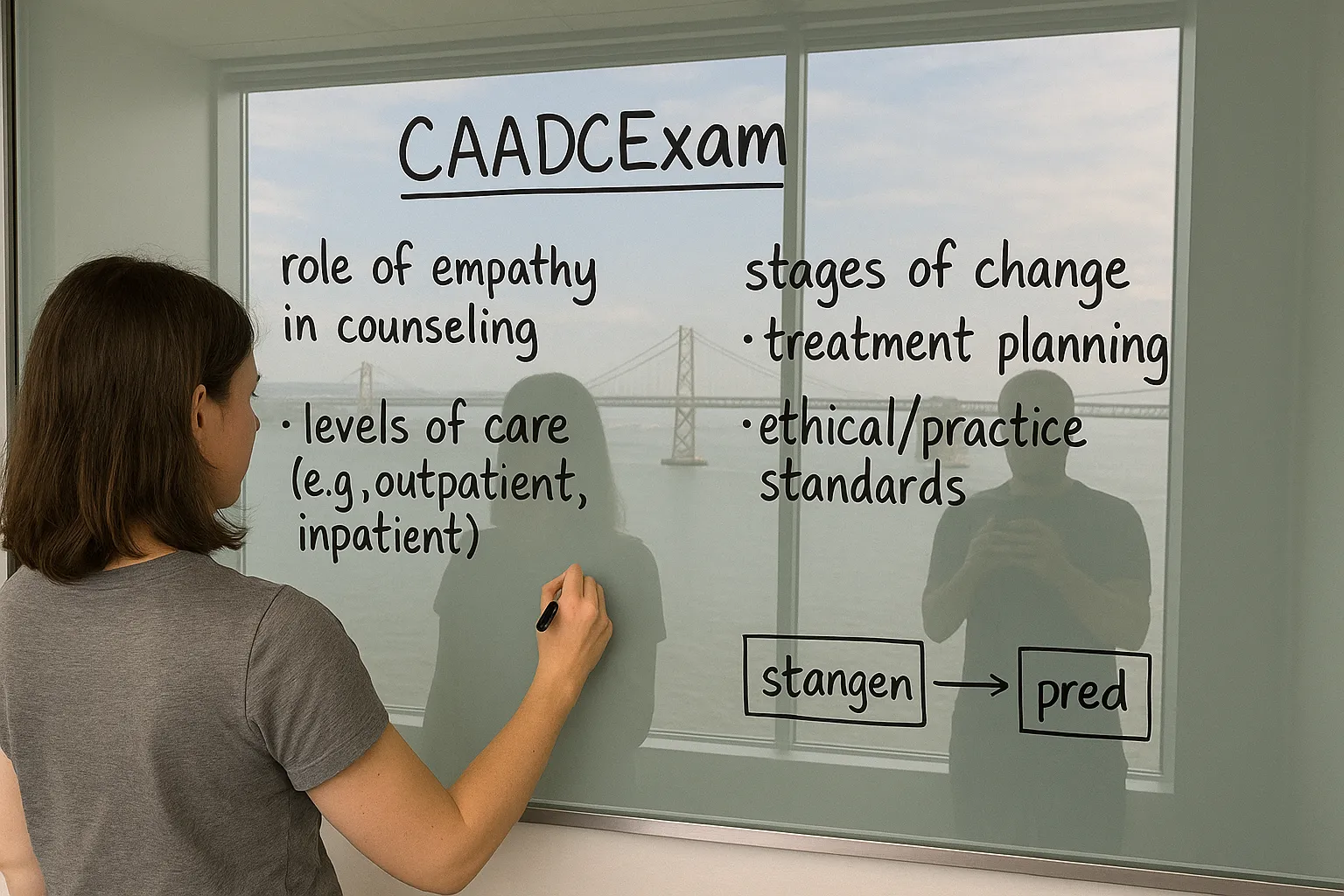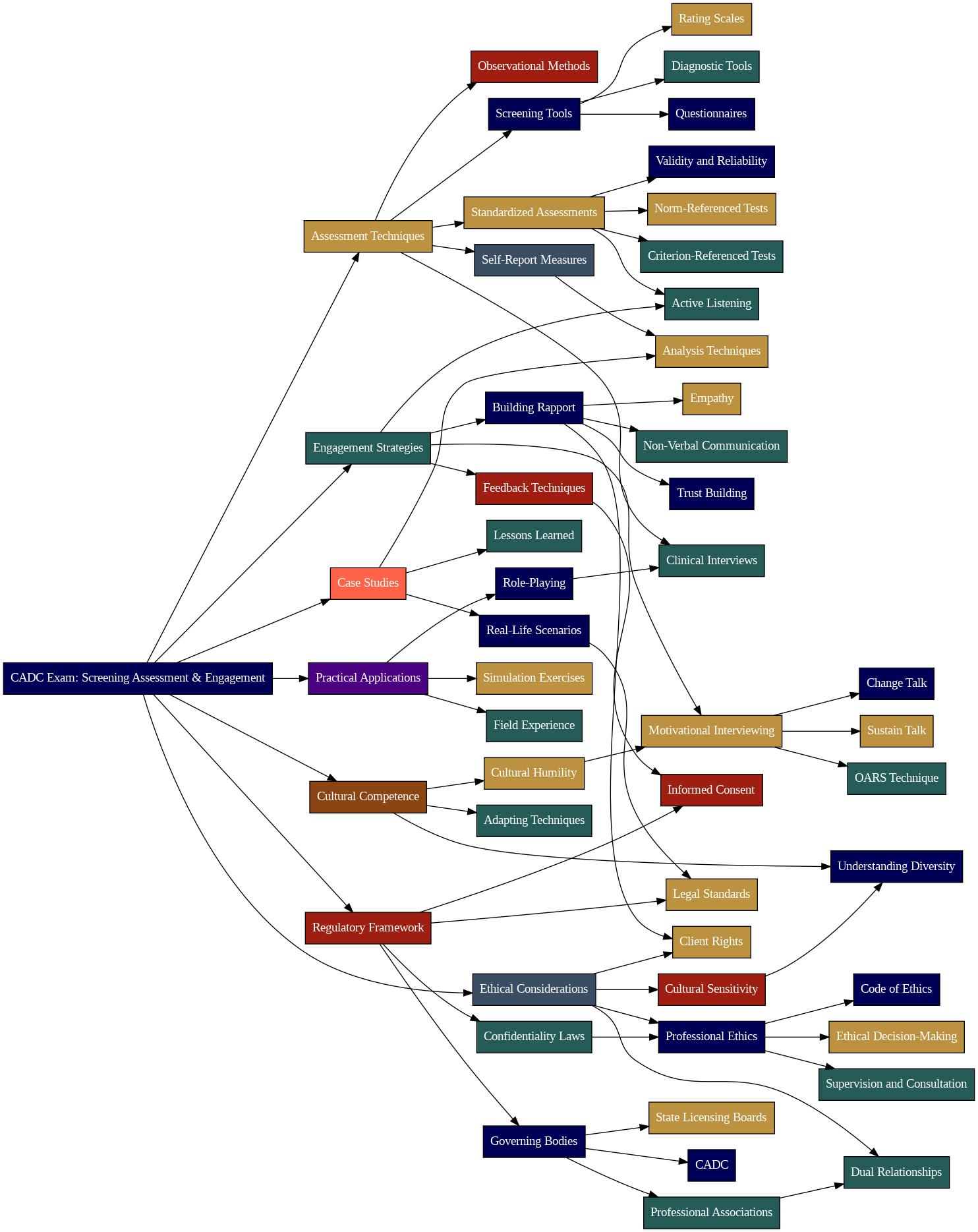Quiz-summary
0 of 30 questions completed
Questions:
- 1
- 2
- 3
- 4
- 5
- 6
- 7
- 8
- 9
- 10
- 11
- 12
- 13
- 14
- 15
- 16
- 17
- 18
- 19
- 20
- 21
- 22
- 23
- 24
- 25
- 26
- 27
- 28
- 29
- 30
Information
Premium Practice Questions
You have already completed the quiz before. Hence you can not start it again.
Quiz is loading...
You must sign in or sign up to start the quiz.
You have to finish following quiz, to start this quiz:
Results
0 of 30 questions answered correctly
Your time:
Time has elapsed
Categories
- Not categorized 0%
- 1
- 2
- 3
- 4
- 5
- 6
- 7
- 8
- 9
- 10
- 11
- 12
- 13
- 14
- 15
- 16
- 17
- 18
- 19
- 20
- 21
- 22
- 23
- 24
- 25
- 26
- 27
- 28
- 29
- 30
- Answered
- Review
-
Question 1 of 30
1. Question
An LCDC in Arkansas is working with a client, Aaliyah, who has a significant history of childhood trauma. Due to unforeseen circumstances, the counselor must unexpectedly relocate out of state and terminate Aaliyah’s treatment within two weeks. What is the MOST ethically responsible approach for the counselor to take in this situation, considering Aaliyah’s trauma history?
Correct
Trauma-informed care recognizes the widespread impact of trauma and strives to avoid re-traumatization. A core principle is creating a safe and predictable environment. This involves clear communication, consistency in actions, and establishing trust. Unexpected changes or abrupt terminations can trigger trauma responses, especially in clients with a history of trauma. While counselors may need to terminate services due to various reasons (e.g., client non-compliance, counselor relocation), doing so abruptly without proper preparation can be harmful. A gradual termination process, including discussing the reasons for termination, providing referrals to other resources, and allowing the client time to process their feelings, is essential in trauma-informed care. This approach helps the client feel more in control and reduces the risk of abandonment or re-traumatization.
Incorrect
Trauma-informed care recognizes the widespread impact of trauma and strives to avoid re-traumatization. A core principle is creating a safe and predictable environment. This involves clear communication, consistency in actions, and establishing trust. Unexpected changes or abrupt terminations can trigger trauma responses, especially in clients with a history of trauma. While counselors may need to terminate services due to various reasons (e.g., client non-compliance, counselor relocation), doing so abruptly without proper preparation can be harmful. A gradual termination process, including discussing the reasons for termination, providing referrals to other resources, and allowing the client time to process their feelings, is essential in trauma-informed care. This approach helps the client feel more in control and reduces the risk of abandonment or re-traumatization.
-
Question 2 of 30
2. Question
An Arkansas LCDC discovers that a client has relapsed after several months of sobriety and is now driving under the influence of alcohol on a regular basis. The client refuses to stop drinking and driving, despite the counselor’s warnings about the potential consequences. Using an ethical decision-making model, what is the MOST appropriate next step for the counselor after identifying the ethical problem and reviewing relevant ethical codes?
Correct
In Arkansas, ethical decision-making for Licensed Chemical Dependency Counselors (LCDCs) often involves navigating complex situations where competing values and principles are at stake. A structured ethical decision-making model provides a framework for analyzing these dilemmas, considering all relevant factors, and selecting the most ethically justifiable course of action. One commonly used model includes the following steps: identifying the ethical problem, reviewing relevant ethical codes and legal standards, consulting with supervisors or colleagues, generating possible courses of action, evaluating the potential consequences of each action, choosing the best course of action, implementing the decision, and evaluating the outcome. When faced with an ethical dilemma, Arkansas LCDCs must first clearly define the issue and identify the stakeholders involved. They should then consult the ethical codes of their profession, as well as relevant state and federal laws, to determine the applicable standards. Seeking supervision or consultation with experienced colleagues can provide valuable insights and perspectives. The next step is to brainstorm a range of possible courses of action, considering the potential benefits and risks of each option. The counselor should then evaluate the potential consequences of each action for all stakeholders, including the client, the counselor, and the community. The chosen course of action should be the one that best protects the client’s well-being, upholds ethical principles, and complies with legal requirements. After implementing the decision, the counselor should evaluate the outcome to determine whether it achieved the desired results and whether any unintended consequences occurred. This process of reflection and evaluation can help the counselor learn from the experience and improve their ethical decision-making skills in the future. Documentation of the entire decision-making process is crucial to demonstrate accountability and transparency.
Incorrect
In Arkansas, ethical decision-making for Licensed Chemical Dependency Counselors (LCDCs) often involves navigating complex situations where competing values and principles are at stake. A structured ethical decision-making model provides a framework for analyzing these dilemmas, considering all relevant factors, and selecting the most ethically justifiable course of action. One commonly used model includes the following steps: identifying the ethical problem, reviewing relevant ethical codes and legal standards, consulting with supervisors or colleagues, generating possible courses of action, evaluating the potential consequences of each action, choosing the best course of action, implementing the decision, and evaluating the outcome. When faced with an ethical dilemma, Arkansas LCDCs must first clearly define the issue and identify the stakeholders involved. They should then consult the ethical codes of their profession, as well as relevant state and federal laws, to determine the applicable standards. Seeking supervision or consultation with experienced colleagues can provide valuable insights and perspectives. The next step is to brainstorm a range of possible courses of action, considering the potential benefits and risks of each option. The counselor should then evaluate the potential consequences of each action for all stakeholders, including the client, the counselor, and the community. The chosen course of action should be the one that best protects the client’s well-being, upholds ethical principles, and complies with legal requirements. After implementing the decision, the counselor should evaluate the outcome to determine whether it achieved the desired results and whether any unintended consequences occurred. This process of reflection and evaluation can help the counselor learn from the experience and improve their ethical decision-making skills in the future. Documentation of the entire decision-making process is crucial to demonstrate accountability and transparency.
-
Question 3 of 30
3. Question
During an initial session with a new client in Arkansas, an LCDC learns that the client has a significant history of childhood trauma. Which of the following approaches would be MOST consistent with trauma-informed care principles?
Correct
Trauma-informed care recognizes the widespread impact of trauma and aims to create a safe and supportive environment that promotes healing. A key principle is to avoid re-traumatization, which can occur when interventions trigger past trauma experiences. Asking a client to repeatedly recount traumatic events in detail without adequate preparation or support can be re-traumatizing. Focusing on coping skills and grounding techniques helps clients manage distress and build resilience. Establishing safety and trust is essential before exploring trauma history. Validating the client’s experiences and emotions is a crucial aspect of trauma-informed care. While processing the trauma is important, it should be done at the client’s pace and with appropriate support.
Incorrect
Trauma-informed care recognizes the widespread impact of trauma and aims to create a safe and supportive environment that promotes healing. A key principle is to avoid re-traumatization, which can occur when interventions trigger past trauma experiences. Asking a client to repeatedly recount traumatic events in detail without adequate preparation or support can be re-traumatizing. Focusing on coping skills and grounding techniques helps clients manage distress and build resilience. Establishing safety and trust is essential before exploring trauma history. Validating the client’s experiences and emotions is a crucial aspect of trauma-informed care. While processing the trauma is important, it should be done at the client’s pace and with appropriate support.
-
Question 4 of 30
4. Question
A Licensed Chemical Dependency Counselor (LCDC) in a small, rural Arkansas town is approached by someone they know casually from local community events seeking counseling services. Which of the following actions BEST demonstrates ethical decision-making in this scenario, according to Arkansas LCDC guidelines?
Correct
According to Arkansas regulations for LCDCs, maintaining professional boundaries is crucial to ensure ethical conduct and prevent exploitation of clients. Dual relationships, where a counselor has a professional and personal relationship with a client, are generally discouraged and can be unethical. However, specific circumstances might present challenges. If a counselor in a rural Arkansas community is asked to provide services to a person they know casually through community events, it doesn’t automatically constitute an ethical violation, but requires careful consideration. The counselor must assess the potential for impaired objectivity, compromised professional judgment, and risk of exploitation. Factors to consider include the nature of the prior relationship, the counselor’s ability to remain objective, and the client’s vulnerability. Disclosing the pre-existing relationship to a supervisor and documenting the steps taken to mitigate potential harm are essential. If the counselor determines that the dual relationship poses a significant risk, they should refer the client to another qualified professional. Seeking supervision is paramount to ensure the counselor is acting ethically and in the best interest of the client, aligning with the ethical guidelines for LCDCs in Arkansas. The primary goal is to protect the client’s well-being and maintain the integrity of the therapeutic relationship. Ignoring the potential conflict and proceeding without careful consideration or supervision would be a violation of ethical standards.
Incorrect
According to Arkansas regulations for LCDCs, maintaining professional boundaries is crucial to ensure ethical conduct and prevent exploitation of clients. Dual relationships, where a counselor has a professional and personal relationship with a client, are generally discouraged and can be unethical. However, specific circumstances might present challenges. If a counselor in a rural Arkansas community is asked to provide services to a person they know casually through community events, it doesn’t automatically constitute an ethical violation, but requires careful consideration. The counselor must assess the potential for impaired objectivity, compromised professional judgment, and risk of exploitation. Factors to consider include the nature of the prior relationship, the counselor’s ability to remain objective, and the client’s vulnerability. Disclosing the pre-existing relationship to a supervisor and documenting the steps taken to mitigate potential harm are essential. If the counselor determines that the dual relationship poses a significant risk, they should refer the client to another qualified professional. Seeking supervision is paramount to ensure the counselor is acting ethically and in the best interest of the client, aligning with the ethical guidelines for LCDCs in Arkansas. The primary goal is to protect the client’s well-being and maintain the integrity of the therapeutic relationship. Ignoring the potential conflict and proceeding without careful consideration or supervision would be a violation of ethical standards.
-
Question 5 of 30
5. Question
An LCDC in Arkansas, named Aaliyah, is conducting a counseling session via telehealth. The client, David, suddenly discloses that he has a detailed plan to end his life tonight, including the method and location, and confirms he has access to the means. What is Aaliyah’s most ethical and legally responsible course of action?
Correct
This scenario involves assessing the immediate safety of a client, which is paramount. The client’s expressed suicidal ideation with a specific plan and access to means constitutes a crisis situation requiring immediate intervention. Duty to warn and protect laws in Arkansas (and generally) mandate taking action to prevent harm to the client or others. Notifying emergency services is the most appropriate immediate response to ensure the client’s safety. While contacting the client’s family, consulting with a supervisor, and exploring the client’s feelings are important steps, they should not delay the immediate action of ensuring safety.
Incorrect
This scenario involves assessing the immediate safety of a client, which is paramount. The client’s expressed suicidal ideation with a specific plan and access to means constitutes a crisis situation requiring immediate intervention. Duty to warn and protect laws in Arkansas (and generally) mandate taking action to prevent harm to the client or others. Notifying emergency services is the most appropriate immediate response to ensure the client’s safety. While contacting the client’s family, consulting with a supervisor, and exploring the client’s feelings are important steps, they should not delay the immediate action of ensuring safety.
-
Question 6 of 30
6. Question
A licensed chemical dependency counselor (LCDC) in Arkansas is working with Jamie, a client struggling with opioid addiction. During a session, Jamie discloses that they physically abused their spouse, but states they are no longer in contact. Which of the following actions BEST reflects the LCDC’s ethical and legal obligations in this scenario, considering Arkansas-specific regulations and guidelines?
Correct
In Arkansas, an LCDC encountering a client disclosing past physical abuse by their spouse faces a complex ethical situation. While generally bound by confidentiality under Arkansas regulations governing counselor-client relationships, there exists a legal and ethical “duty to warn and protect” potential victims. This duty is not absolute but triggered when the counselor reasonably believes the client poses an imminent threat of serious physical harm to a readily identifiable victim. The counselor must assess the credibility and immediacy of the threat. If the threat is deemed credible and imminent, the LCDC has a duty to take reasonable steps to protect the intended victim, which may include notifying the potential victim, law enforcement, or both. This decision must be carefully documented, considering the potential impact on the therapeutic relationship and the client’s willingness to engage in treatment. Consultation with a supervisor or legal counsel is strongly advised to navigate this complex ethical and legal landscape, ensuring compliance with Arkansas-specific regulations and ethical guidelines for licensed chemical dependency counselors. Failing to act appropriately could expose the counselor to legal liability and ethical sanctions. The key is balancing client confidentiality with the safety and well-being of potential victims, guided by professional judgment and legal requirements. The Arkansas State Board of Examiners of Alcoholism and Drug Abuse Counselors provides guidance on these matters.
Incorrect
In Arkansas, an LCDC encountering a client disclosing past physical abuse by their spouse faces a complex ethical situation. While generally bound by confidentiality under Arkansas regulations governing counselor-client relationships, there exists a legal and ethical “duty to warn and protect” potential victims. This duty is not absolute but triggered when the counselor reasonably believes the client poses an imminent threat of serious physical harm to a readily identifiable victim. The counselor must assess the credibility and immediacy of the threat. If the threat is deemed credible and imminent, the LCDC has a duty to take reasonable steps to protect the intended victim, which may include notifying the potential victim, law enforcement, or both. This decision must be carefully documented, considering the potential impact on the therapeutic relationship and the client’s willingness to engage in treatment. Consultation with a supervisor or legal counsel is strongly advised to navigate this complex ethical and legal landscape, ensuring compliance with Arkansas-specific regulations and ethical guidelines for licensed chemical dependency counselors. Failing to act appropriately could expose the counselor to legal liability and ethical sanctions. The key is balancing client confidentiality with the safety and well-being of potential victims, guided by professional judgment and legal requirements. The Arkansas State Board of Examiners of Alcoholism and Drug Abuse Counselors provides guidance on these matters.
-
Question 7 of 30
7. Question
An LCDC in Hot Springs, Arkansas, is working with a new client, Ms. Evans, who has a history of both substance use and childhood trauma. When beginning to inquire about Ms. Evans’s past trauma, what is the MOST appropriate approach from a trauma-informed care perspective?
Correct
Trauma-informed care recognizes the widespread impact of trauma and aims to avoid re-traumatization. Key principles include safety, trustworthiness and transparency, peer support, collaboration and mutuality, empowerment, voice and choice, and cultural, historical, and gender issues. Creating a safe and predictable environment is paramount. This involves explaining procedures, being transparent about treatment goals, and respecting the client’s boundaries. In this scenario, informing the client about the purpose of the questions, ensuring confidentiality, and allowing the client to decline to answer any question promotes safety and trustworthiness. Asking about specific details of traumatic events without proper preparation or consent could be re-traumatizing. Therefore, the most appropriate approach is to explain the purpose, ensure confidentiality, and allow the client to decline answering any question.
Incorrect
Trauma-informed care recognizes the widespread impact of trauma and aims to avoid re-traumatization. Key principles include safety, trustworthiness and transparency, peer support, collaboration and mutuality, empowerment, voice and choice, and cultural, historical, and gender issues. Creating a safe and predictable environment is paramount. This involves explaining procedures, being transparent about treatment goals, and respecting the client’s boundaries. In this scenario, informing the client about the purpose of the questions, ensuring confidentiality, and allowing the client to decline to answer any question promotes safety and trustworthiness. Asking about specific details of traumatic events without proper preparation or consent could be re-traumatizing. Therefore, the most appropriate approach is to explain the purpose, ensure confidentiality, and allow the client to decline answering any question.
-
Question 8 of 30
8. Question
Jamal, an LCDC in Arkansas, is working with a client, DeShawn, who discloses during a session that he is actively involved in distributing methamphetamine within the community. DeShawn states that he needs the money to support his own addiction and that he has no intention of stopping. Which of the following actions should Jamal prioritize, considering Arkansas laws and ethical guidelines for LCDCs?
Correct
In Arkansas, an LCDC encountering a client disclosing active participation in a felony, such as distribution of controlled substances, faces a complex ethical and legal dilemma. The duty to maintain client confidentiality, a cornerstone of the therapeutic relationship, is not absolute. Arkansas law, aligned with federal regulations, outlines exceptions to confidentiality, particularly when there is a risk of harm to self or others, or when legally mandated. In this scenario, the counselor must weigh the client’s right to privacy against the potential harm to the community and the legal obligation to report certain crimes. The counselor should first thoroughly assess the client’s statements to determine the immediacy and severity of the threat. Consultation with a supervisor or legal counsel is crucial to navigate this ethical quandary. The counselor must also consider the potential impact of reporting on the therapeutic relationship and the client’s willingness to engage in treatment. If the counselor determines that reporting is necessary, they should inform the client of their intention to do so, explaining the legal and ethical reasons behind the decision. The specific reporting requirements in Arkansas for felonies involving controlled substances would dictate the appropriate course of action, potentially involving notification of law enforcement or other relevant authorities. The decision-making process should be carefully documented, outlining the rationale for the chosen course of action and any consultations undertaken. The primary goal is to balance the client’s needs with the safety and well-being of the community, while adhering to the ethical and legal standards of the LCDC profession in Arkansas.
Incorrect
In Arkansas, an LCDC encountering a client disclosing active participation in a felony, such as distribution of controlled substances, faces a complex ethical and legal dilemma. The duty to maintain client confidentiality, a cornerstone of the therapeutic relationship, is not absolute. Arkansas law, aligned with federal regulations, outlines exceptions to confidentiality, particularly when there is a risk of harm to self or others, or when legally mandated. In this scenario, the counselor must weigh the client’s right to privacy against the potential harm to the community and the legal obligation to report certain crimes. The counselor should first thoroughly assess the client’s statements to determine the immediacy and severity of the threat. Consultation with a supervisor or legal counsel is crucial to navigate this ethical quandary. The counselor must also consider the potential impact of reporting on the therapeutic relationship and the client’s willingness to engage in treatment. If the counselor determines that reporting is necessary, they should inform the client of their intention to do so, explaining the legal and ethical reasons behind the decision. The specific reporting requirements in Arkansas for felonies involving controlled substances would dictate the appropriate course of action, potentially involving notification of law enforcement or other relevant authorities. The decision-making process should be carefully documented, outlining the rationale for the chosen course of action and any consultations undertaken. The primary goal is to balance the client’s needs with the safety and well-being of the community, while adhering to the ethical and legal standards of the LCDC profession in Arkansas.
-
Question 9 of 30
9. Question
Ms. Johnson, an Arkansas resident in treatment for alcohol use disorder, reports experiencing persistent fatigue, unexplained weight loss, and changes in her bowel habits. What is the MOST appropriate course of action for the LCDC to take?
Correct
The Arkansas State Board of Examiners of Alcoholism and Drug Abuse Counselors sets the scope of practice for LCDCs in the state. This scope of practice defines the services that LCDCs are legally and ethically qualified to provide. While LCDCs are trained to provide counseling and support related to substance use disorders, they are not typically qualified to provide medical diagnoses or prescribe medication. In this scenario, the client, Ms. Johnson, is experiencing symptoms that could be related to a medical condition. The LCDC should refer Ms. Johnson to a qualified healthcare professional, such as a physician or psychiatrist, for a medical evaluation. This ensures that Ms. Johnson receives appropriate medical care and that the LCDC is practicing within their scope of practice.
Incorrect
The Arkansas State Board of Examiners of Alcoholism and Drug Abuse Counselors sets the scope of practice for LCDCs in the state. This scope of practice defines the services that LCDCs are legally and ethically qualified to provide. While LCDCs are trained to provide counseling and support related to substance use disorders, they are not typically qualified to provide medical diagnoses or prescribe medication. In this scenario, the client, Ms. Johnson, is experiencing symptoms that could be related to a medical condition. The LCDC should refer Ms. Johnson to a qualified healthcare professional, such as a physician or psychiatrist, for a medical evaluation. This ensures that Ms. Johnson receives appropriate medical care and that the LCDC is practicing within their scope of practice.
-
Question 10 of 30
10. Question
An Arkansas LCDC is working with a client from a Native American tribe who expresses distrust of traditional Western medical approaches to addiction treatment. Which of the following actions BEST demonstrates cultural competence in this situation?
Correct
Cultural competence in chemical dependency counseling refers to the ability of counselors to effectively work with clients from diverse cultural backgrounds. It involves understanding and respecting cultural differences, being aware of one’s own cultural biases, and adapting counseling approaches to meet the unique needs of each client. In the context of Arkansas LCDC practice, cultural competence is essential for addressing the diverse needs of the state’s population, which includes individuals from various racial, ethnic, socioeconomic, and religious backgrounds. Counselors must be aware of the cultural factors that can influence substance use, treatment seeking, and recovery outcomes. These factors may include cultural beliefs about addiction, family dynamics, communication styles, and access to resources. Culturally competent counselors use culturally sensitive assessment tools, adapt treatment plans to align with clients’ cultural values, and collaborate with community resources to provide culturally appropriate support. They also engage in ongoing self-reflection and professional development to enhance their cultural awareness and skills.
Incorrect
Cultural competence in chemical dependency counseling refers to the ability of counselors to effectively work with clients from diverse cultural backgrounds. It involves understanding and respecting cultural differences, being aware of one’s own cultural biases, and adapting counseling approaches to meet the unique needs of each client. In the context of Arkansas LCDC practice, cultural competence is essential for addressing the diverse needs of the state’s population, which includes individuals from various racial, ethnic, socioeconomic, and religious backgrounds. Counselors must be aware of the cultural factors that can influence substance use, treatment seeking, and recovery outcomes. These factors may include cultural beliefs about addiction, family dynamics, communication styles, and access to resources. Culturally competent counselors use culturally sensitive assessment tools, adapt treatment plans to align with clients’ cultural values, and collaborate with community resources to provide culturally appropriate support. They also engage in ongoing self-reflection and professional development to enhance their cultural awareness and skills.
-
Question 11 of 30
11. Question
An LCDC in Arkansas, Ben, is working with a client, Marcus, who presents with symptoms of both substance use disorder and severe depression. Which of the following actions would be *most* clearly outside Ben’s scope of practice as an LCDC in Arkansas?
Correct
In Arkansas, the scope of practice for a Licensed Chemical Dependency Counselor (LCDC) is defined by state law and regulations, primarily the Arkansas Board of Examiners of Alcoholism and Drug Abuse Counselors. This scope dictates the specific activities and services an LCDC is legally authorized to perform. Generally, an LCDC’s scope includes assessment, diagnosis, treatment planning, individual and group counseling, relapse prevention, and case management services related to substance use disorders. They are trained to address the psychological, behavioral, and social aspects of addiction. However, it is crucial to understand the limitations of the LCDC scope of practice. LCDCs are *not* licensed to provide medical services, prescribe medication, or conduct psychological testing that falls outside the realm of substance use assessment. They must work in collaboration with other healthcare professionals, such as physicians and psychologists, when addressing co-occurring medical or mental health conditions. Furthermore, LCDCs must practice within their area of competence, seeking supervision and continuing education to maintain and enhance their skills. Practicing outside the scope of practice can have serious legal and ethical consequences, including disciplinary action by the Arkansas Board, potential lawsuits, and harm to clients. It is the LCDC’s responsibility to be knowledgeable about the scope of practice and to seek guidance when uncertain about the appropriateness of a particular activity. Clear communication with clients about the LCDC’s qualifications and limitations is also essential for maintaining ethical practice and building trust.
Incorrect
In Arkansas, the scope of practice for a Licensed Chemical Dependency Counselor (LCDC) is defined by state law and regulations, primarily the Arkansas Board of Examiners of Alcoholism and Drug Abuse Counselors. This scope dictates the specific activities and services an LCDC is legally authorized to perform. Generally, an LCDC’s scope includes assessment, diagnosis, treatment planning, individual and group counseling, relapse prevention, and case management services related to substance use disorders. They are trained to address the psychological, behavioral, and social aspects of addiction. However, it is crucial to understand the limitations of the LCDC scope of practice. LCDCs are *not* licensed to provide medical services, prescribe medication, or conduct psychological testing that falls outside the realm of substance use assessment. They must work in collaboration with other healthcare professionals, such as physicians and psychologists, when addressing co-occurring medical or mental health conditions. Furthermore, LCDCs must practice within their area of competence, seeking supervision and continuing education to maintain and enhance their skills. Practicing outside the scope of practice can have serious legal and ethical consequences, including disciplinary action by the Arkansas Board, potential lawsuits, and harm to clients. It is the LCDC’s responsibility to be knowledgeable about the scope of practice and to seek guidance when uncertain about the appropriateness of a particular activity. Clear communication with clients about the LCDC’s qualifications and limitations is also essential for maintaining ethical practice and building trust.
-
Question 12 of 30
12. Question
DeShawn, an Arkansas resident and client in chemical dependency counseling for alcohol abuse, reveals to his LCDC that he plans to “make Fatima [his estranged wife] pay” for filing for divorce and mentions knowing where she lives and works. DeShawn has a prior conviction for domestic violence against Fatima. Which of the following actions should the LCDC prioritize FIRST, considering Arkansas law and ethical guidelines regarding duty to warn and protect?
Correct
In Arkansas, the duty to warn and protect, stemming from the Tarasoff ruling and subsequent interpretations, requires Licensed Chemical Dependency Counselors (LCDCs) to take reasonable steps to protect individuals who may be threatened by their clients. This duty is not absolute and is balanced against client confidentiality. The specific actions an LCDC must take depend on the circumstances, but generally involve assessing the credibility and immediacy of the threat, identifying the potential victim, and taking steps to warn the victim or notify law enforcement. In the scenario, DeShawn has expressed a specific and credible threat towards his estranged wife, Fatima. He has a history of domestic violence, which increases the seriousness of the threat. While DeShawn’s statement was made during a counseling session, the potential harm to Fatima overrides the usual confidentiality protections. The LCDC must act to protect Fatima. Doing nothing would be a violation of the duty to warn. Consulting with a supervisor is a prudent step, but it should not delay immediate action. Only warning DeShawn is insufficient to protect Fatima. Therefore, the most appropriate course of action is to immediately notify Fatima and local law enforcement of the credible threat. This fulfills the LCDC’s ethical and legal obligations under Arkansas law and the duty to protect.
Incorrect
In Arkansas, the duty to warn and protect, stemming from the Tarasoff ruling and subsequent interpretations, requires Licensed Chemical Dependency Counselors (LCDCs) to take reasonable steps to protect individuals who may be threatened by their clients. This duty is not absolute and is balanced against client confidentiality. The specific actions an LCDC must take depend on the circumstances, but generally involve assessing the credibility and immediacy of the threat, identifying the potential victim, and taking steps to warn the victim or notify law enforcement. In the scenario, DeShawn has expressed a specific and credible threat towards his estranged wife, Fatima. He has a history of domestic violence, which increases the seriousness of the threat. While DeShawn’s statement was made during a counseling session, the potential harm to Fatima overrides the usual confidentiality protections. The LCDC must act to protect Fatima. Doing nothing would be a violation of the duty to warn. Consulting with a supervisor is a prudent step, but it should not delay immediate action. Only warning DeShawn is insufficient to protect Fatima. Therefore, the most appropriate course of action is to immediately notify Fatima and local law enforcement of the credible threat. This fulfills the LCDC’s ethical and legal obligations under Arkansas law and the duty to protect.
-
Question 13 of 30
13. Question
A client, Omar, in an outpatient substance use treatment program in Arkansas, discloses to his LCDC that he intends to physically harm his estranged wife, stating, “I’m going to make sure she regrets what she did.” According to Arkansas statutes and ethical guidelines for LCDCs, what is the MOST appropriate course of action for the counselor?
Correct
According to Arkansas regulations for Licensed Chemical Dependency Counselors (LCDCs), a “duty to warn” situation arises when a client presents a serious and imminent threat to a clearly identifiable third party. This duty overrides the usual confidentiality protections. The counselor must take reasonable steps to protect the intended victim, which may include notifying the potential victim, law enforcement, or taking other actions to mitigate the threat. Simply documenting the threat in the client’s file, without taking further action, would not fulfill the legal and ethical obligations of duty to warn. Consulting with a supervisor is a prudent step, but it does not absolve the counselor of the responsibility to act to protect the potential victim. Seeking a court order might be a necessary step in some complex situations, but in cases of imminent danger, immediate action is required before obtaining a court order. The primary focus is on protecting the potential victim from immediate harm, necessitating direct intervention. This involves assessing the credibility and immediacy of the threat, identifying the intended victim, and implementing appropriate protective measures, all while adhering to ethical guidelines and legal mandates. The counselor’s actions must be defensible and proportionate to the level of risk presented by the client.
Incorrect
According to Arkansas regulations for Licensed Chemical Dependency Counselors (LCDCs), a “duty to warn” situation arises when a client presents a serious and imminent threat to a clearly identifiable third party. This duty overrides the usual confidentiality protections. The counselor must take reasonable steps to protect the intended victim, which may include notifying the potential victim, law enforcement, or taking other actions to mitigate the threat. Simply documenting the threat in the client’s file, without taking further action, would not fulfill the legal and ethical obligations of duty to warn. Consulting with a supervisor is a prudent step, but it does not absolve the counselor of the responsibility to act to protect the potential victim. Seeking a court order might be a necessary step in some complex situations, but in cases of imminent danger, immediate action is required before obtaining a court order. The primary focus is on protecting the potential victim from immediate harm, necessitating direct intervention. This involves assessing the credibility and immediacy of the threat, identifying the intended victim, and implementing appropriate protective measures, all while adhering to ethical guidelines and legal mandates. The counselor’s actions must be defensible and proportionate to the level of risk presented by the client.
-
Question 14 of 30
14. Question
An Arkansas LCDC, David, is working with a client, Maria, who has a history of childhood trauma. Maria becomes visibly distressed during a counseling session and begins to dissociate. What is the *MOST* appropriate response for David to take in this situation, based on trauma-informed care principles?
Correct
In Arkansas, crisis and trauma-informed care are essential components of effective substance use treatment. Principles of trauma-informed care include safety, trustworthiness, choice, collaboration, and empowerment. Recognizing signs of trauma in clients involves being aware of the potential impact of trauma on behavior, emotions, and relationships. Integrating trauma-informed approaches in treatment involves modifying treatment strategies to address the unique needs of individuals with a history of trauma. Building safety and trust in counseling is crucial for creating a therapeutic environment where clients feel comfortable disclosing their experiences. Addressing secondary trauma in counselors involves providing support and resources to help counselors cope with the emotional impact of working with traumatized clients.
Incorrect
In Arkansas, crisis and trauma-informed care are essential components of effective substance use treatment. Principles of trauma-informed care include safety, trustworthiness, choice, collaboration, and empowerment. Recognizing signs of trauma in clients involves being aware of the potential impact of trauma on behavior, emotions, and relationships. Integrating trauma-informed approaches in treatment involves modifying treatment strategies to address the unique needs of individuals with a history of trauma. Building safety and trust in counseling is crucial for creating a therapeutic environment where clients feel comfortable disclosing their experiences. Addressing secondary trauma in counselors involves providing support and resources to help counselors cope with the emotional impact of working with traumatized clients.
-
Question 15 of 30
15. Question
During a counseling session in Fayetteville, Arkansas, an LCDC, named Imani, is working with a client, Dale, who is struggling with opioid addiction. Dale reveals that his 8-year-old son, without providing explicit details, is often left unsupervised for extended periods while Dale is “out trying to score.” Imani also notices that Dale seems emotionally detached when speaking about his son. Based on Arkansas law and ethical guidelines for LCDCs, what is Imani’s MOST appropriate course of action?
Correct
Arkansas LCDCs are mandated reporters, meaning they are legally obligated to report suspected child maltreatment or neglect. The duty to report arises when the LCDC has reasonable cause to believe that a child has been subjected to abuse or neglect. This duty is paramount, overriding confidentiality concerns to protect the child’s well-being. The specific Arkansas statute that outlines this obligation is the Arkansas Child Maltreatment Reporting Act. Failure to report suspected child maltreatment can result in legal penalties for the LCDC. The “reasonable cause to believe” standard requires more than a mere suspicion but less than absolute certainty. The information available to the LCDC should be sufficient to lead a reasonable person to suspect that abuse or neglect has occurred. This reporting obligation extends to situations where the child is at risk of harm, not just when harm has already occurred. The report must be made to the Arkansas Department of Human Services (DHS) or law enforcement. The report should include the child’s name and address, the nature of the suspected abuse or neglect, and any other information that the reporter believes may be helpful. The LCDC is immune from liability for making a good-faith report, even if the report is later determined to be unfounded.
Incorrect
Arkansas LCDCs are mandated reporters, meaning they are legally obligated to report suspected child maltreatment or neglect. The duty to report arises when the LCDC has reasonable cause to believe that a child has been subjected to abuse or neglect. This duty is paramount, overriding confidentiality concerns to protect the child’s well-being. The specific Arkansas statute that outlines this obligation is the Arkansas Child Maltreatment Reporting Act. Failure to report suspected child maltreatment can result in legal penalties for the LCDC. The “reasonable cause to believe” standard requires more than a mere suspicion but less than absolute certainty. The information available to the LCDC should be sufficient to lead a reasonable person to suspect that abuse or neglect has occurred. This reporting obligation extends to situations where the child is at risk of harm, not just when harm has already occurred. The report must be made to the Arkansas Department of Human Services (DHS) or law enforcement. The report should include the child’s name and address, the nature of the suspected abuse or neglect, and any other information that the reporter believes may be helpful. The LCDC is immune from liability for making a good-faith report, even if the report is later determined to be unfounded.
-
Question 16 of 30
16. Question
An LCDC in Hot Springs, Arkansas, is evaluating a new client, David, for a potential substance use disorder. After a thorough assessment, the LCDC determines that David meets four of the eleven DSM-5 criteria for alcohol use disorder. Based on this information, which of the following DSM-5 severity classifications would be MOST appropriate for David’s diagnosis?
Correct
The DSM-5 (Diagnostic and Statistical Manual of Mental Disorders, 5th Edition) provides specific criteria for diagnosing substance use disorders. These criteria are organized into eleven categories, encompassing impaired control, social impairment, risky use, and pharmacological criteria (tolerance and withdrawal). A diagnosis is made based on the number of criteria met, with severity ranging from mild (2-3 criteria) to moderate (4-5 criteria) to severe (6 or more criteria). It’s crucial for Arkansas LCDCs to understand these criteria to accurately assess and diagnose substance use disorders. The DSM-5 also emphasizes the importance of considering cultural and contextual factors in diagnosis. The manual includes specifiers to indicate the type of substance, the course of the disorder (e.g., in early remission, in sustained remission), and the presence of co-occurring disorders. A thorough understanding of the DSM-5 criteria is essential for developing appropriate treatment plans and for communicating effectively with other healthcare professionals. The Arkansas LCDC exam tests the candidate’s knowledge of these criteria and their ability to apply them in clinical practice.
Incorrect
The DSM-5 (Diagnostic and Statistical Manual of Mental Disorders, 5th Edition) provides specific criteria for diagnosing substance use disorders. These criteria are organized into eleven categories, encompassing impaired control, social impairment, risky use, and pharmacological criteria (tolerance and withdrawal). A diagnosis is made based on the number of criteria met, with severity ranging from mild (2-3 criteria) to moderate (4-5 criteria) to severe (6 or more criteria). It’s crucial for Arkansas LCDCs to understand these criteria to accurately assess and diagnose substance use disorders. The DSM-5 also emphasizes the importance of considering cultural and contextual factors in diagnosis. The manual includes specifiers to indicate the type of substance, the course of the disorder (e.g., in early remission, in sustained remission), and the presence of co-occurring disorders. A thorough understanding of the DSM-5 criteria is essential for developing appropriate treatment plans and for communicating effectively with other healthcare professionals. The Arkansas LCDC exam tests the candidate’s knowledge of these criteria and their ability to apply them in clinical practice.
-
Question 17 of 30
17. Question
Jamal, an LCDC in Arkansas, is working with a client, DeShawn, who is struggling with methamphetamine addiction. During a session, DeShawn reveals a detailed plan to physically harm his estranged wife, Latoya, including the time and location he intends to carry out the act. DeShawn has a history of domestic violence, although Latoya has not reported any recent incidents. Considering Arkansas’s ethical guidelines and legal obligations for LCDCs, what is Jamal’s MOST appropriate course of action?
Correct
According to Arkansas regulations governing Licensed Chemical Dependency Counselors (LCDCs), particularly concerning client confidentiality and duty to warn, an LCDC faces a complex ethical and legal dilemma when a client discloses intent to harm a specific, identifiable third party. While confidentiality is paramount, Arkansas law, aligning with broader legal precedents established in cases like Tarasoff v. Regents of the University of California, imposes a duty to protect. This duty mandates that the counselor take reasonable steps to prevent the threatened harm. Reasonable steps may include, but are not limited to, directly warning the intended victim, notifying law enforcement, or taking other actions necessary to mitigate the risk. Failing to act could expose the LCDC to legal liability and ethical sanctions. It’s crucial to document all actions taken and the rationale behind them, demonstrating adherence to ethical guidelines and legal requirements. The specific wording of Arkansas statutes and regulations on privileged communication and exceptions related to threats of violence would govern the LCDC’s actions. The LCDC must balance the client’s right to confidentiality with the safety of potential victims, consulting with supervisors and legal counsel as needed to navigate this challenging situation ethically and legally.
Incorrect
According to Arkansas regulations governing Licensed Chemical Dependency Counselors (LCDCs), particularly concerning client confidentiality and duty to warn, an LCDC faces a complex ethical and legal dilemma when a client discloses intent to harm a specific, identifiable third party. While confidentiality is paramount, Arkansas law, aligning with broader legal precedents established in cases like Tarasoff v. Regents of the University of California, imposes a duty to protect. This duty mandates that the counselor take reasonable steps to prevent the threatened harm. Reasonable steps may include, but are not limited to, directly warning the intended victim, notifying law enforcement, or taking other actions necessary to mitigate the risk. Failing to act could expose the LCDC to legal liability and ethical sanctions. It’s crucial to document all actions taken and the rationale behind them, demonstrating adherence to ethical guidelines and legal requirements. The specific wording of Arkansas statutes and regulations on privileged communication and exceptions related to threats of violence would govern the LCDC’s actions. The LCDC must balance the client’s right to confidentiality with the safety of potential victims, consulting with supervisors and legal counsel as needed to navigate this challenging situation ethically and legally.
-
Question 18 of 30
18. Question
During a counseling session, a client named Carlos in Arkansas expresses strong resistance to the idea of attending 12-step meetings, stating, “Those meetings are a waste of time. I don’t need to sit around listening to other people’s problems.” According to the principles of Motivational Interviewing, what is the MOST appropriate response from the counselor?
Correct
Motivational Interviewing (MI) is a client-centered, directive method for enhancing intrinsic motivation to change by exploring and resolving ambivalence. A core principle of MI is to roll with resistance, rather than directly confronting it. Arguing or trying to persuade a client who is resistant can strengthen their opposition and damage the therapeutic relationship. Instead, the counselor should acknowledge the client’s perspective, explore their concerns, and help them to identify their own reasons for change. This approach is particularly effective in working with individuals who are ambivalent about addressing their substance use. The goal is to create a collaborative and supportive environment where the client feels empowered to make their own decisions.
Incorrect
Motivational Interviewing (MI) is a client-centered, directive method for enhancing intrinsic motivation to change by exploring and resolving ambivalence. A core principle of MI is to roll with resistance, rather than directly confronting it. Arguing or trying to persuade a client who is resistant can strengthen their opposition and damage the therapeutic relationship. Instead, the counselor should acknowledge the client’s perspective, explore their concerns, and help them to identify their own reasons for change. This approach is particularly effective in working with individuals who are ambivalent about addressing their substance use. The goal is to create a collaborative and supportive environment where the client feels empowered to make their own decisions.
-
Question 19 of 30
19. Question
An Arkansas LCDC is experiencing persistent feelings of fatigue, irritability, and detachment from clients, despite consistently working overtime to meet their needs. What is the MOST appropriate initial self-care strategy for this counselor to implement?
Correct
Arkansas LCDCs must understand the importance of self-care to prevent burnout and maintain their effectiveness. Counseling is a demanding profession that can expose counselors to vicarious trauma, emotional distress, and high levels of stress. Self-care involves engaging in activities that promote physical, emotional, social, and spiritual well-being. Strategies for managing burnout include setting professional boundaries, seeking supervision or consultation, practicing mindfulness and stress reduction techniques, engaging in regular exercise, maintaining a healthy diet, and pursuing hobbies and interests outside of work. Counselors should also be aware of their own personal triggers and vulnerabilities and develop coping mechanisms for managing difficult emotions. Furthermore, seeking professional counseling or therapy can be beneficial for addressing personal issues and preventing burnout. Prioritizing self-care is not selfish; it is an ethical responsibility that ensures counselors can provide competent and compassionate care to their clients.
Incorrect
Arkansas LCDCs must understand the importance of self-care to prevent burnout and maintain their effectiveness. Counseling is a demanding profession that can expose counselors to vicarious trauma, emotional distress, and high levels of stress. Self-care involves engaging in activities that promote physical, emotional, social, and spiritual well-being. Strategies for managing burnout include setting professional boundaries, seeking supervision or consultation, practicing mindfulness and stress reduction techniques, engaging in regular exercise, maintaining a healthy diet, and pursuing hobbies and interests outside of work. Counselors should also be aware of their own personal triggers and vulnerabilities and develop coping mechanisms for managing difficult emotions. Furthermore, seeking professional counseling or therapy can be beneficial for addressing personal issues and preventing burnout. Prioritizing self-care is not selfish; it is an ethical responsibility that ensures counselors can provide competent and compassionate care to their clients.
-
Question 20 of 30
20. Question
An Arkansas LCDC, Kai, is using Cognitive Behavioral Therapy (CBT) with a client, Darius, who is attempting to maintain sobriety after completing inpatient treatment for alcohol use disorder. Darius reports feeling overwhelmed by cravings when he attends social events with friends who still drink. Which CBT technique would be MOST appropriate to address this challenge?
Correct
Cognitive Behavioral Therapy (CBT) is a widely used, evidence-based treatment modality for substance use disorders. CBT focuses on identifying and modifying maladaptive thoughts, feelings, and behaviors that contribute to substance use. Key components of CBT include functional analysis, cognitive restructuring, coping skills training, and relapse prevention. Functional analysis involves identifying triggers, thoughts, feelings, and behaviors associated with substance use. Cognitive restructuring helps clients challenge and change negative or distorted thinking patterns. Coping skills training equips clients with strategies to manage cravings, stress, and high-risk situations. Relapse prevention focuses on developing a plan to prevent relapse and manage cravings. In Arkansas LCDC practice, CBT can be used to address a wide range of substance use disorders and co-occurring mental health conditions. It is important to tailor CBT techniques to the client’s individual needs and cultural background.
Incorrect
Cognitive Behavioral Therapy (CBT) is a widely used, evidence-based treatment modality for substance use disorders. CBT focuses on identifying and modifying maladaptive thoughts, feelings, and behaviors that contribute to substance use. Key components of CBT include functional analysis, cognitive restructuring, coping skills training, and relapse prevention. Functional analysis involves identifying triggers, thoughts, feelings, and behaviors associated with substance use. Cognitive restructuring helps clients challenge and change negative or distorted thinking patterns. Coping skills training equips clients with strategies to manage cravings, stress, and high-risk situations. Relapse prevention focuses on developing a plan to prevent relapse and manage cravings. In Arkansas LCDC practice, CBT can be used to address a wide range of substance use disorders and co-occurring mental health conditions. It is important to tailor CBT techniques to the client’s individual needs and cultural background.
-
Question 21 of 30
21. Question
A Licensed Chemical Dependency Counselor (LCDC) in Arkansas is working with a client, DeShawn, who is struggling with opioid addiction. During a session, DeShawn discloses that his neighbor, an elderly woman with dementia, is being financially exploited by her grandson, who is stealing her social security checks to buy drugs. DeShawn is visibly distressed and expresses fear for his neighbor’s safety. The LCDC has no direct contact with the neighbor or her grandson, and DeShawn is the sole source of this information. Under Arkansas law, what is the LCDC’s ethical and legal obligation regarding this situation?
Correct
In Arkansas, Licensed Chemical Dependency Counselors (LCDCs) are mandated reporters under specific circumstances outlined in state law, primarily concerning the welfare of children and vulnerable adults. While the general principle of confidentiality is paramount, exceptions exist when there’s reasonable cause to suspect abuse, neglect, or exploitation. The duty to report is triggered when a counselor has direct knowledge or observes evidence that suggests a child is being subjected to physical injury, sexual abuse, or neglect, or that a vulnerable adult is being exploited, abused, or neglected. This duty supersedes confidentiality agreements. Simply suspecting potential harm based on client statements or behavior patterns is insufficient to trigger mandatory reporting; there must be reasonable cause, meaning a credible basis for believing harm has occurred or is imminent. The counselor’s role is to protect vulnerable individuals while respecting client autonomy within legal and ethical boundaries. Failure to report when reasonable cause exists can result in legal penalties and disciplinary action by the licensing board. The counselor must carefully document the basis for their reasonable cause and the steps taken to report the suspected abuse or neglect. Consulting with a supervisor or legal counsel is advisable in complex situations to ensure compliance with Arkansas law and ethical standards.
Incorrect
In Arkansas, Licensed Chemical Dependency Counselors (LCDCs) are mandated reporters under specific circumstances outlined in state law, primarily concerning the welfare of children and vulnerable adults. While the general principle of confidentiality is paramount, exceptions exist when there’s reasonable cause to suspect abuse, neglect, or exploitation. The duty to report is triggered when a counselor has direct knowledge or observes evidence that suggests a child is being subjected to physical injury, sexual abuse, or neglect, or that a vulnerable adult is being exploited, abused, or neglected. This duty supersedes confidentiality agreements. Simply suspecting potential harm based on client statements or behavior patterns is insufficient to trigger mandatory reporting; there must be reasonable cause, meaning a credible basis for believing harm has occurred or is imminent. The counselor’s role is to protect vulnerable individuals while respecting client autonomy within legal and ethical boundaries. Failure to report when reasonable cause exists can result in legal penalties and disciplinary action by the licensing board. The counselor must carefully document the basis for their reasonable cause and the steps taken to report the suspected abuse or neglect. Consulting with a supervisor or legal counsel is advisable in complex situations to ensure compliance with Arkansas law and ethical standards.
-
Question 22 of 30
22. Question
What is the MOST important benefit of receiving regular supervision for an Arkansas LCDC?
Correct
Supervision is a critical component of professional development for LCDCs. It provides an opportunity for counselors to receive feedback, guidance, and support from experienced professionals. Effective supervision helps counselors develop their skills, enhance their competence, and address ethical dilemmas. Different supervision models exist, including developmental, integrative, and task-oriented approaches. Supervision should be a collaborative process, with the supervisor and supervisee working together to identify goals, monitor progress, and address challenges. Self-care is also an important aspect of professional development, as it helps counselors manage stress, prevent burnout, and maintain their well-being.
Incorrect
Supervision is a critical component of professional development for LCDCs. It provides an opportunity for counselors to receive feedback, guidance, and support from experienced professionals. Effective supervision helps counselors develop their skills, enhance their competence, and address ethical dilemmas. Different supervision models exist, including developmental, integrative, and task-oriented approaches. Supervision should be a collaborative process, with the supervisor and supervisee working together to identify goals, monitor progress, and address challenges. Self-care is also an important aspect of professional development, as it helps counselors manage stress, prevent burnout, and maintain their well-being.
-
Question 23 of 30
23. Question
During a counseling session, an Arkansas LCDC, Maria, is working with a client, Terrance, who is struggling with opioid addiction. Terrance casually mentions that he often leaves his 6-year-old child, Aaliyah, home alone for several hours while he goes to obtain drugs. Maria observes that Terrance seems unconcerned about Aaliyah’s safety. What is Maria’s legal and ethical obligation in this situation?
Correct
Arkansas LCDCs are mandated reporters of suspected child maltreatment under Arkansas law. This means that if an LCDC has reasonable cause to suspect that a child is being subjected to abuse or neglect, they are legally obligated to report it to the appropriate authorities, typically the Arkansas Department of Human Services (DHS). This duty supersedes confidentiality concerns. The reasonable suspicion threshold is lower than proof; the LCDC does not need to be certain that abuse or neglect is occurring, but rather must have a good faith belief based on the available information. The report should be made as soon as possible, and the LCDC is typically protected from liability if the report is made in good faith. Failing to report suspected child maltreatment can result in legal penalties for the LCDC.
Incorrect
Arkansas LCDCs are mandated reporters of suspected child maltreatment under Arkansas law. This means that if an LCDC has reasonable cause to suspect that a child is being subjected to abuse or neglect, they are legally obligated to report it to the appropriate authorities, typically the Arkansas Department of Human Services (DHS). This duty supersedes confidentiality concerns. The reasonable suspicion threshold is lower than proof; the LCDC does not need to be certain that abuse or neglect is occurring, but rather must have a good faith belief based on the available information. The report should be made as soon as possible, and the LCDC is typically protected from liability if the report is made in good faith. Failing to report suspected child maltreatment can result in legal penalties for the LCDC.
-
Question 24 of 30
24. Question
A client, Imani, receiving telehealth counseling for substance use disorder from an Arkansas LCDC, initiates a session from what appears to be a public park. During the session, Imani discloses suicidal ideation and states they have immediate access to potentially lethal means. According to Arkansas regulations and ethical guidelines for telehealth, what is the MOST appropriate initial course of action for the LCDC?
Correct
Arkansas regulations regarding telehealth for LCDCs stipulate that counselors must ensure the client’s location is appropriate for receiving services, considering privacy and safety. The counselor must verify the client’s location at the start of each session and document it in the client’s record. This is crucial for addressing potential crisis situations and coordinating with local emergency services if needed. Furthermore, Arkansas LCDCs offering telehealth must adhere to the same ethical guidelines and standards of care as in-person services, including maintaining confidentiality and obtaining informed consent specific to telehealth. This consent should cover potential risks and benefits of telehealth, emergency protocols, and data security measures. It is also important to consider the client’s access to technology and their ability to use it effectively, as well as any cultural or linguistic barriers that may affect the delivery of telehealth services. If the client’s location poses a risk or is unsuitable for treatment, the counselor has a responsibility to address these concerns and may need to transition to in-person services or provide referrals to local resources. The ethical decision-making process involves assessing the situation, considering relevant ethical codes and legal requirements, consulting with supervisors or colleagues, and documenting the decision-making process.
Incorrect
Arkansas regulations regarding telehealth for LCDCs stipulate that counselors must ensure the client’s location is appropriate for receiving services, considering privacy and safety. The counselor must verify the client’s location at the start of each session and document it in the client’s record. This is crucial for addressing potential crisis situations and coordinating with local emergency services if needed. Furthermore, Arkansas LCDCs offering telehealth must adhere to the same ethical guidelines and standards of care as in-person services, including maintaining confidentiality and obtaining informed consent specific to telehealth. This consent should cover potential risks and benefits of telehealth, emergency protocols, and data security measures. It is also important to consider the client’s access to technology and their ability to use it effectively, as well as any cultural or linguistic barriers that may affect the delivery of telehealth services. If the client’s location poses a risk or is unsuitable for treatment, the counselor has a responsibility to address these concerns and may need to transition to in-person services or provide referrals to local resources. The ethical decision-making process involves assessing the situation, considering relevant ethical codes and legal requirements, consulting with supervisors or colleagues, and documenting the decision-making process.
-
Question 25 of 30
25. Question
Jamal, an LCDC in Arkansas, is working with a client, Keisha, who is in recovery from methamphetamine addiction. During a session, Keisha expresses intense anger towards her former abusive partner, Davon, stating, “I feel like I could really hurt him. He deserves it.” Keisha has a history of violent behavior when using substances, but has been sober for six months and consistently attends support groups. Davon’s current whereabouts are unknown to Keisha. According to the ethical guidelines and legal considerations for Arkansas LCDCs regarding duty to warn, what is Jamal’s MOST appropriate course of action?
Correct
Arkansas LCDCs operate under a legal and ethical framework that prioritizes client well-being and public safety. The duty to warn and protect, as it pertains to chemical dependency counseling, stems from the landmark Tarasoff case and subsequent legal interpretations. While Arkansas law doesn’t explicitly codify “duty to warn” in the same way as some other states, the ethical obligation to protect potential victims from imminent harm is paramount and is interwoven with the counselor’s responsibilities under the Arkansas Rules of Professional Conduct and related statutes governing licensed professionals. This requires a careful balancing act between maintaining client confidentiality and taking necessary steps to prevent foreseeable harm. The determination of “imminent danger” is crucial and must be based on a reasonable assessment of the client’s statements, behaviors, and history. When a counselor reasonably believes a client poses a serious threat of physical violence to a clearly identifiable victim or victims, they have a duty to take reasonable steps to protect those individuals. This may include notifying the potential victim(s), notifying law enforcement, or taking other actions deemed necessary to mitigate the risk. Failing to act appropriately in such situations could expose the counselor to legal liability and ethical sanctions. The counselor’s actions must be documented thoroughly, including the basis for the belief of imminent danger, the steps taken to protect the potential victim(s), and any consultations with supervisors or legal counsel.
Incorrect
Arkansas LCDCs operate under a legal and ethical framework that prioritizes client well-being and public safety. The duty to warn and protect, as it pertains to chemical dependency counseling, stems from the landmark Tarasoff case and subsequent legal interpretations. While Arkansas law doesn’t explicitly codify “duty to warn” in the same way as some other states, the ethical obligation to protect potential victims from imminent harm is paramount and is interwoven with the counselor’s responsibilities under the Arkansas Rules of Professional Conduct and related statutes governing licensed professionals. This requires a careful balancing act between maintaining client confidentiality and taking necessary steps to prevent foreseeable harm. The determination of “imminent danger” is crucial and must be based on a reasonable assessment of the client’s statements, behaviors, and history. When a counselor reasonably believes a client poses a serious threat of physical violence to a clearly identifiable victim or victims, they have a duty to take reasonable steps to protect those individuals. This may include notifying the potential victim(s), notifying law enforcement, or taking other actions deemed necessary to mitigate the risk. Failing to act appropriately in such situations could expose the counselor to legal liability and ethical sanctions. The counselor’s actions must be documented thoroughly, including the basis for the belief of imminent danger, the steps taken to protect the potential victim(s), and any consultations with supervisors or legal counsel.
-
Question 26 of 30
26. Question
A licensed chemical dependency counselor (LCDC) in Arkansas is working with a client who is struggling financially but owns a motorcycle worth approximately $5,000. The client proposes bartering the motorcycle in exchange for several months of counseling sessions. According to the Arkansas Rules and Regulations for Licensed Alcohol and Drug Abuse Counselors, which of the following actions is MOST ethically sound and legally compliant?
Correct
The Arkansas Rules and Regulations for Licensed Alcohol and Drug Abuse Counselors (LADC/LCDC) emphasize the importance of maintaining strict professional boundaries to protect the integrity of the therapeutic relationship and prevent exploitation of clients. Dual relationships, particularly those involving financial transactions beyond standard counseling fees, pose a significant ethical risk. While bartering may seem mutually beneficial, it can blur the lines of the professional relationship, potentially compromising objectivity and creating conflicts of interest. The power differential inherent in the counselor-client relationship makes clients vulnerable to exploitation, even if the bartering arrangement appears equitable on the surface. The Arkansas regulations specifically address the need to avoid situations where the counselor’s personal or financial interests could influence their professional judgment. Accepting a valuable item like a motorcycle in exchange for counseling services introduces a complex dynamic that could negatively impact the client’s treatment and the counselor’s ethical standing. This action could be viewed as a violation of the counselor’s fiduciary duty and could lead to disciplinary action by the Arkansas Board of Examiners. The regulations prioritize the client’s well-being and the maintenance of clear professional boundaries, making such an arrangement ethically problematic and potentially illegal.
Incorrect
The Arkansas Rules and Regulations for Licensed Alcohol and Drug Abuse Counselors (LADC/LCDC) emphasize the importance of maintaining strict professional boundaries to protect the integrity of the therapeutic relationship and prevent exploitation of clients. Dual relationships, particularly those involving financial transactions beyond standard counseling fees, pose a significant ethical risk. While bartering may seem mutually beneficial, it can blur the lines of the professional relationship, potentially compromising objectivity and creating conflicts of interest. The power differential inherent in the counselor-client relationship makes clients vulnerable to exploitation, even if the bartering arrangement appears equitable on the surface. The Arkansas regulations specifically address the need to avoid situations where the counselor’s personal or financial interests could influence their professional judgment. Accepting a valuable item like a motorcycle in exchange for counseling services introduces a complex dynamic that could negatively impact the client’s treatment and the counselor’s ethical standing. This action could be viewed as a violation of the counselor’s fiduciary duty and could lead to disciplinary action by the Arkansas Board of Examiners. The regulations prioritize the client’s well-being and the maintenance of clear professional boundaries, making such an arrangement ethically problematic and potentially illegal.
-
Question 27 of 30
27. Question
A client, Javier, in an outpatient substance abuse treatment program in Arkansas, discloses to his LCDC that he intends to physically harm his estranged wife, Maria, when she picks up their children next week. Javier has a history of domestic violence, and the LCDC believes he poses a serious threat to Maria. What is the LCDC’s most appropriate course of action, according to Arkansas regulations and ethical guidelines?
Correct
According to Arkansas regulations and ethical guidelines for LCDCs, confidentiality is paramount but not absolute. The “duty to warn and protect” arises when a client poses a credible and imminent threat to an identifiable third party. This duty supersedes confidentiality. The counselor must take reasonable steps to protect the intended victim, which may include notifying the potential victim, law enforcement, or taking other actions to mitigate the threat. This principle is rooted in the Tarasoff decision and is reflected in Arkansas’s professional standards for licensed counselors. Simply encouraging the client to self-report, while a good initial step, does not fulfill the legal and ethical duty if the threat remains imminent and credible. Consulting with a supervisor is advisable, but immediate action is required when a threat is present. Referring the client to a higher level of care may be appropriate for the client’s overall treatment, but it doesn’t directly address the immediate danger to the third party.
Incorrect
According to Arkansas regulations and ethical guidelines for LCDCs, confidentiality is paramount but not absolute. The “duty to warn and protect” arises when a client poses a credible and imminent threat to an identifiable third party. This duty supersedes confidentiality. The counselor must take reasonable steps to protect the intended victim, which may include notifying the potential victim, law enforcement, or taking other actions to mitigate the threat. This principle is rooted in the Tarasoff decision and is reflected in Arkansas’s professional standards for licensed counselors. Simply encouraging the client to self-report, while a good initial step, does not fulfill the legal and ethical duty if the threat remains imminent and credible. Consulting with a supervisor is advisable, but immediate action is required when a threat is present. Referring the client to a higher level of care may be appropriate for the client’s overall treatment, but it doesn’t directly address the immediate danger to the third party.
-
Question 28 of 30
28. Question
A client, Javier, in long-term recovery relapses and during a counseling session with his Arkansas LCDC, expresses anger towards his former employer, claiming they unfairly terminated him. Javier states, “They’ll regret firing me. They’ll see what happens.” While Javier has a history of impulsive behavior, he doesn’t explicitly state an intention to harm anyone. What is the MOST ETHICALLY sound course of action for the LCDC, considering Arkansas-specific guidelines and general ethical principles?
Correct
In Arkansas, the duty to warn and protect, as it applies to Licensed Chemical Dependency Counselors (LCDCs), is rooted in legal precedents established across the United States, primarily stemming from the Tarasoff case. While Arkansas statutes may not explicitly codify “Tarasoff” in the same way some other states do, the underlying principle of protecting individuals from imminent harm is a core ethical and legal consideration. An LCDC’s responsibility is triggered when a client presents a serious and imminent threat of harm to a specifically identifiable victim or victims. The counselor must then take reasonable steps to prevent that harm, which may include warning the potential victim(s), notifying law enforcement, or taking other actions necessary to ensure safety. The decision to breach confidentiality must be carefully considered, documented, and based on a thorough assessment of the client’s threat, the credibility of the threat, and the imminence of danger. This decision should be made in consultation with supervisors and legal counsel whenever possible. The counselor must balance the client’s right to confidentiality with the overriding duty to protect individuals from harm. Simply having a client with a history of violence or substance use issues does not automatically trigger the duty to warn; there must be a credible and imminent threat. Failing to act appropriately when such a threat exists could expose the LCDC to legal liability and ethical sanctions. Conversely, breaching confidentiality without a legitimate and imminent threat could also result in legal and ethical repercussions. The key is a careful, informed, and documented decision-making process.
Incorrect
In Arkansas, the duty to warn and protect, as it applies to Licensed Chemical Dependency Counselors (LCDCs), is rooted in legal precedents established across the United States, primarily stemming from the Tarasoff case. While Arkansas statutes may not explicitly codify “Tarasoff” in the same way some other states do, the underlying principle of protecting individuals from imminent harm is a core ethical and legal consideration. An LCDC’s responsibility is triggered when a client presents a serious and imminent threat of harm to a specifically identifiable victim or victims. The counselor must then take reasonable steps to prevent that harm, which may include warning the potential victim(s), notifying law enforcement, or taking other actions necessary to ensure safety. The decision to breach confidentiality must be carefully considered, documented, and based on a thorough assessment of the client’s threat, the credibility of the threat, and the imminence of danger. This decision should be made in consultation with supervisors and legal counsel whenever possible. The counselor must balance the client’s right to confidentiality with the overriding duty to protect individuals from harm. Simply having a client with a history of violence or substance use issues does not automatically trigger the duty to warn; there must be a credible and imminent threat. Failing to act appropriately when such a threat exists could expose the LCDC to legal liability and ethical sanctions. Conversely, breaching confidentiality without a legitimate and imminent threat could also result in legal and ethical repercussions. The key is a careful, informed, and documented decision-making process.
-
Question 29 of 30
29. Question
An Arkansas LCDC has been working with a client, Mr. Thompson, for several months. Mr. Thompson expresses deep gratitude for the counselor’s help and offers to give the counselor his old, but still functional, car as a gift, stating that he no longer needs it and wants the counselor to have it. What is the MOST ethically appropriate course of action for the LCDC to take?
Correct
Professional boundaries are crucial in the therapeutic relationship. Dual relationships, where the counselor has a relationship with the client outside of the professional setting, can compromise objectivity, exploit the client, and blur the lines of appropriate behavior. Arkansas regulations and ethical guidelines for LCDCs strictly discourage dual relationships. Accepting a gift from a client, especially a substantial one like a used car, creates a dual relationship and violates professional boundaries. It can create a power imbalance and the client may perceive that they will receive better treatment or preferential treatment. The counselor should politely decline the gift and explain the ethical reasons for doing so. It’s also important to document the incident and the counselor’s response in the client’s file.
Incorrect
Professional boundaries are crucial in the therapeutic relationship. Dual relationships, where the counselor has a relationship with the client outside of the professional setting, can compromise objectivity, exploit the client, and blur the lines of appropriate behavior. Arkansas regulations and ethical guidelines for LCDCs strictly discourage dual relationships. Accepting a gift from a client, especially a substantial one like a used car, creates a dual relationship and violates professional boundaries. It can create a power imbalance and the client may perceive that they will receive better treatment or preferential treatment. The counselor should politely decline the gift and explain the ethical reasons for doing so. It’s also important to document the incident and the counselor’s response in the client’s file.
-
Question 30 of 30
30. Question
An LCDC in Arkansas, Omar, is working with a client, Sarah, who is also a member of the same small, rural church that Omar attends. Omar and Sarah occasionally interact at church functions. According to Arkansas LCDC ethical guidelines, what is Omar’s *most* appropriate course of action regarding this situation?
Correct
According to Arkansas regulations for Licensed Chemical Dependency Counselors (LCDCs), dual relationships, also known as multiple relationships, occur when a counselor has a professional relationship with a client and also has another type of relationship with the same person. These relationships can be social, familial, business, or sexual in nature. Arkansas LCDC regulations generally prohibit dual relationships that could impair the counselor’s objectivity, compromise the client’s well-being, or exploit the client. The power differential inherent in the counselor-client relationship makes clients vulnerable to exploitation, and dual relationships can blur boundaries and create conflicts of interest. Counselors must carefully consider the potential risks and benefits of any dual relationship and avoid situations where their judgment could be compromised. In some cases, dual relationships may be unavoidable, such as in small rural communities where the counselor may have limited options for avoiding contact with clients outside of the counseling setting. In these situations, counselors must take steps to minimize the risks of harm to the client, such as obtaining informed consent, seeking supervision, and documenting their decision-making process. Sexual relationships with current or former clients are strictly prohibited and are considered a serious ethical violation.
Incorrect
According to Arkansas regulations for Licensed Chemical Dependency Counselors (LCDCs), dual relationships, also known as multiple relationships, occur when a counselor has a professional relationship with a client and also has another type of relationship with the same person. These relationships can be social, familial, business, or sexual in nature. Arkansas LCDC regulations generally prohibit dual relationships that could impair the counselor’s objectivity, compromise the client’s well-being, or exploit the client. The power differential inherent in the counselor-client relationship makes clients vulnerable to exploitation, and dual relationships can blur boundaries and create conflicts of interest. Counselors must carefully consider the potential risks and benefits of any dual relationship and avoid situations where their judgment could be compromised. In some cases, dual relationships may be unavoidable, such as in small rural communities where the counselor may have limited options for avoiding contact with clients outside of the counseling setting. In these situations, counselors must take steps to minimize the risks of harm to the client, such as obtaining informed consent, seeking supervision, and documenting their decision-making process. Sexual relationships with current or former clients are strictly prohibited and are considered a serious ethical violation.


























